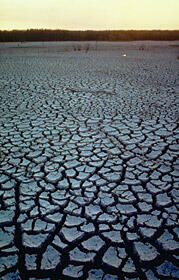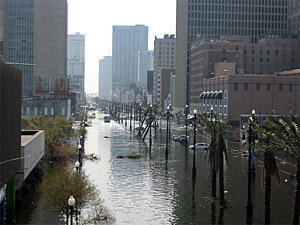Dear Zarion,
I wish I could tell you what the future will bring, but no one knows for sure how global warming will play out.

What do you think the future of our planet will be? Will it be hot from global warming or will we have another ice age?
— Zarion J., Grade 10
Geologist Ed Mathez answers this question:
Dear Zarion,
I wish I could tell you what the future will bring, but no one knows for sure how global warming will play out.
In fact, not knowing is one of the problems. Global warming is a significant risk to society. On the one hand, we do not know exactly what will happen. On the other, we realize that what could happen could be serious. And these consequences could affect different parts of the world in different ways.
For example, there could be long periods of low rainfall in a particular region. The western United States is one area that is at particular risk to widespread drought.

Drought can dry up the land.
Another consequence is the rise of sea level. Over the next several decades, sea level will probably rise 10 to 20 centimeters (4 to 8 inches). This may not sound like much, but it may cause extensive damage, for example, erosion to coastlines. In addition, it will bring about an increase in the chances of catastrophic floods like the one experienced by New Orleans in 2005.

Floods can damage coastal areas.
Over the next several centuries, sea level may rise 5 or more meters (16 or more feet). Could you imagine how the shorelines of continents will change? Many of today's major coastal cities might be underwater.
Besides drought and sea level rise, there are a variety of other likely changes around the world. There might be intense heat waves, increased incidences of infectious and respiratory diseases, changes in ecosystems particularly at high latitudes, and loss of biodiversity ... just to name a few.
On the bright side, please remember that none of this is inevitable. As a society, we can make choices that will avoid the serious consequences of global warming. There are simple choices that each one of us can make, like installing energy-saving light bulbs in our homes. And then there are choices that we can make together, like choosing leaders who will insist that we figure out a way to keep carbon produced by coal-fired power plants (the most common electric power plants around the world) from going into the atmosphere. There is no single solution, though — there are only many small ones.

Look for lighting labeled "Energy Star." It uses about 75% less energy than standard lighting!
Explore More:

Name:
Edmond Mathez
Job Title:
Curator, Department of Earth & Planetary Sciences
Known For:
Ed is a geologist. He researches the origin and composition of
igneous
rocks.
Cool Fact:
Ed has collected rock samples from all over the world, including Greenland and South Africa. He's gone as deep as 2 kilometers (1.2 miles) down into a mine.